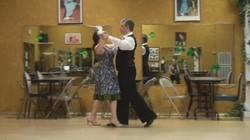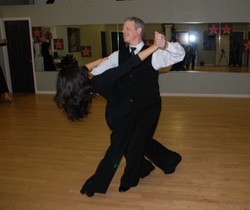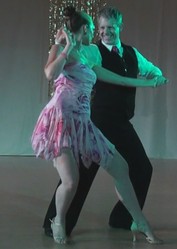Social Foxtrot is slightly faster than the International Slow Foxtrot and fits well on the smaller club sized floors. Compact the Dance Frame and shorten the steps and you can dance Foxtrot practically anywhere. The Silver American foxtrot uses slower music and can be expanded in step size and pattern styling to fill a larger ballroom floor. If you dance International Style consider learning the American figures for their compact steps or Beautiful open hold figures.
Foxtrot Bronze II Combination
A goal for Beginning dancers, putting 4 basic Foxtrot figures in a combination
Foxtrot Bronze II Combination
This will be your first exam :) Four figures danced in a combination. You can do it!
Instead of starting this page with Figure 1 the Basic step. (That's next), Let's look at a combination of step that you could use on the dance floor.
Get an overview of this combination in your mind and then we will look at Step 1.
Note: Start with the Man's right shoulder beside the Nearest wall and give enough room to dance a Basic step. This Combination is Basic, Promenade, Left Rock Turn, Box, and Basic. When you dance it a Second time you will get 2 Basics in a row. Don't leave off the Second Basic.
Foxtrot, Basic Step
Foxtrot, Lesson 1, Basic Step
Foxtrot, Basic Step
Foxtrot, Lesson 1, Basic Step
This is the first figure of social Foxtrot, notice the dance hold. The demonstrators are using an advanced hold. If you are a new dancer separate the two bodies and hold each other by the elbows.
Note: Each partner changes weight 4 times, Leader's start each pattern by stepping with your Left foot, Follower's with your RIght foot.
Foxtrot, Left Rock Turn
Foxtrot, Lesson 2, Left Rock Turn
Foxtrot, Left Rock Turn
Foxtrot, Lesson 2, Left Rock Turn
The Left Rock turn is a "Corner" step, it allows you to change the direction of movement or room alignment.
So you're heading down a wall into a corner, dancing your Basics, the Left Rock Turn can angle you down the next wall.
This pattern can also be used as an Emergency step to avoid collisions with other dancers.
Note: try to step under your partner and not around them, turn more on the rocking action, try not to rotate on the side steps.
Foxtrot, Promenade
Foxtrot, Lesson 3, Promenade
Foxtrot, Promenade
Foxtrot, Lesson 3, Promenade
The promenade is a core figure that shows up in all dances.
It is sometimes described as both partners moving forwards and in the Foxtrot is also called Conversation position.
A good promenade position is worthwhile challenge.
I think you can judge the level of a couples dancing by looking at their promenade.
Note: try to twist only the head and feet leaving your torsos still facing each other, this takes flexibility, coordination and practice.
Foxtrot, Box
Foxtrot, Lesson 4, Box
Foxtrot, Box
Foxtrot, Lesson 4, Box
The Foxtrot box has a change of rhythm from the Basic. The Box is counted Slow Quick Quick, Slow Quick Quick for a total of 8 beats of music vs 6 beats for the basic.
Note: The Foxtrot Box does collect the feet together on beats 2 and 6, Waltz and Rumba do not collect the feet after moving forwards or backwards.
You might also like
WaltzLearn to Waltz with online video tutorials, photos, music recommendations and...
BoleroLearn to dance the modern latin Bolero with Instructional Videos





 Salsaon 02/12/2013
Salsaon 02/12/2013
 Swingon 02/12/2013
Swingon 02/12/2013
 Boleroon 02/12/2013
Boleroon 02/12/2013
 Tangoon 02/11/2013
Tangoon 02/11/2013


Comments
Thanks